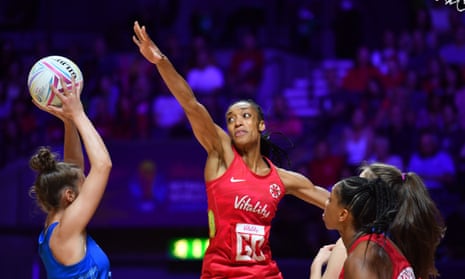A thumping 36-goal victory for England in their second World Cup game over Scotland should have been a cause for confidence in the team. Instead it has dealt them a nasty blow after the key defender Layla Guscoth ruptured her achilles tendon in the first quarter of the match. Guscoth, who pulled up and limped off court with Jade Clarke’s arm round her shoulder, was immediately taken for medical assessment. Within a few hours came the news that she would play no further part in the Liverpool tournament.
England’s manager, Tracey Neville, who went straight to the team hotel to check on Guscoth after the game, later issued a statement confirming the player’s withdrawal. “It is devastating that her journey in this World Cup is over but myself and all of the Roses are by her side supporting her through this time,” said Neville. “We will do everything we can to ensure she is back playing again soon.”
Asked after the game – and before the scope of the injury was confirmed – if England’s defence could cope without Guscoth, her fellow defender Geva Mentor had sounded optimistic. “I think defensively we’d be fine,” said Mentor, although she did raise the issue of the increased workload on the rest of the squad.
“At the moment we’re using a lot of these games not only to improve performances but also keep people as fresh as possible, particularly leading into the pointy end of this tournament. That’s probably where it changes things but we’ve done enough work leading into this that our fitness is high and we can handle it.” There are no injury replacements available to World Cup squads, which include only 12 players per nation.
The news certainly took the shine off a 70-34 victory spearheaded by the shooting efforts of Rachel Dunn. For 25 minutes from the start of play Dunn had maintained a 100% scoring rate; she failed only on her 22nd attempt, a long shot taken from near the edge of the circle that deflected off the rim.
Only three players – Guscoth, Helen Housby and Eboni Usoro-Brown – returned from the starting line-up of the Uganda game as Neville tried out a host of new combinations for England. It was the pairing of Dunn and Clarke, Wasps team-mates, that captured the imagination, Clarke feeding long balls into the circle that Dunn would reach out and collect with telescopic arms. “We’ve built a good connection over the past couple of years,” said Dunn. “It’s just quite comfortable out there playing with her.”
Scotland, currently enjoying their all-time best world ranking of seventh, defended doggedly, using all the team awareness that has come from playing alongside each other as the Strathclyde Sirens in the Superleague. England responded by sending the ball long and high, looping poetic strings of passes from one side to the other. Then Guscoth turned her left ankle and called for a time out. As a qualified doctor, Guscoth was better positioned than anyone to know that she had a problem. In fact, she missed out on last year’s Commonwealth Games while she finished her medical training – which will make this disappointment all the more bitter.
Gail Parata’s women also had their own injury worry in Hayley Mulheron. The veteran goalkeeper, who has suffered shoulder problems, took to the bench twice before rejoining battle with Dunn, and Scotland cannot afford to lose her experience. She is one of only three Scottish players who has played at a World Cup before, and of the 390 caps shared by their squad, 115 belong to her.
There was another strong showing from Scotland’s youngest member, however. Seventeen-year-old Emma Barrie made her international debut on Friday against Samoa and she once again demonstrated an icy cool temperament, scoring 11 from 13. As England pulled away in the third quarter, Parata experimented widely with her team’s combinations but the deficit just kept growing.
Scotland are still on course for the second round of preliminaries, with only the bottom of each group destined to get the chop. It is almost certain to be Samoa, who lost to Uganda on Saturday and face England on Monday. All three British sides, in fact, should make the cut after Northern Ireland beat Sri Lanka 67-50, the captain, Caroline O’Hanlon, winning her 100th cap – and showing no ill effects – 24 hours after she sustained a head injury against Australia.

Comments (…)
Sign in or create your Guardian account to join the discussion